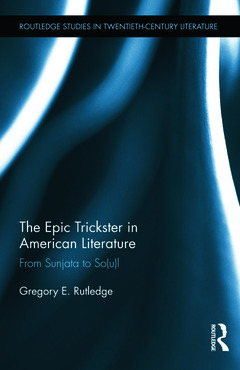The Epic Trickster in American Literature From Sunjata to So(u)l Routledge Studies in Twentieth-Century Literature Series
Auteur : Rutledge Gregory E.

Just as Africa and the West have traditionally fit into binaries of Darkness/Enlightenment, Savage/Modern, Ugly/Beautiful, and Ritual/Art, among others, much of Western cultural production rests upon the archetypal binary of Trickster/Epic, with trickster aesthetics and commensurate cultural forms characterizing Africa. Challenging this binary and the exceptionalism that underlies anti-hegemonic efforts even today, this book begins with the scholarly foundations that mapped out African trickster continuities in the United States and excavated the aesthetics of traditional African epic performances. Rutledge locates trickster-like capacities within the epic hero archetype (the "epic trickster" paradigm) and constructs an Homeric Diaspora, which is to say that the modern Homeric performance foundation lies at an absolute time and distance away from the ancient storytelling performance needed to understand the cautionary aesthetic inseparable from epic potential. As traditional epic performances demonstrate, unchecked epic trickster dynamism anticipates not only brutal imperialism and creative diversity, but the greatest threat to everyone, an eco-apocalypse. Relying upon the preeminent scholarship on African-American trickster-heroes, traditional African heroic performances, and cultural studies approaches to Greco-Roman epics, Rutledge traces the epic trickster aesthetic through three seminal African-American novels keenly attuned to the American Homeric Diaspora: Charles Chesnutt?s The Marrow of Tradition, Richard Wright?s Native Son, and Toni Morrison?s Beloved.
Preface. 1. Introduction 2. Introduction to West/Central African Epic 3. Epic Performance in the American Epic Diaspora 4. All Green with Epic Potential: Chesnutt Goes to the Marrow of Tradition to Re-Construct America’s Epic Body 5. Native Son. Global Warming, Nuclear Winter, and Katrina’s "Folk": African Epic and the Ecological Implications of Wright’s "Blue[s]print" 6. A Beloved, "Ten Times Better" Community: The Epic Trickster and Morrison’s post-Civil Rights Common/Sense 7. Conclusion
Gregory E. Rutledge is Associate Professor with a joint appointment in the Department of English and the Institute for Ethnic Studies at the University of Nebraska, Lincoln, US. His teaching and research interests are American literature and culture, Afro-futurism, critical race theory, and Afro-Orientalism. He has published scholarship, reviews, reference pieces, fiction, and poetry in African-American Review and Modern Fiction Studies.
Date de parution : 02-2013
15.2x22.9 cm
Disponible chez l'éditeur (délai d'approvisionnement : 14 jours).
Prix indicatif 172,36 €
Ajouter au panierDate de parution : 05-2017
15.2x22.9 cm
Disponible chez l'éditeur (délai d'approvisionnement : 14 jours).
Prix indicatif 53,83 €
Ajouter au panierThème de The Epic Trickster in American Literature :
Mots-clés :
Epic Performance; Research; African Epic; Literature; Ozidi Saga; African; Epic Protagonist; American; Homeric Performance; Epic; Mwindo Epic; Homer; Ten Times; Trickster; Epical Realism; Sunjata; Heroic Epic; Trickster Tales; Common Sense; Je Erson; Great Migration; Ho Man; Epic Potential; West African Tale; Native Son; Epic Lore; Dust Bowl; Black Folk Culture; Djibril Tamsir Niane; Cape Fear River; Humped Back; Hip Hop


